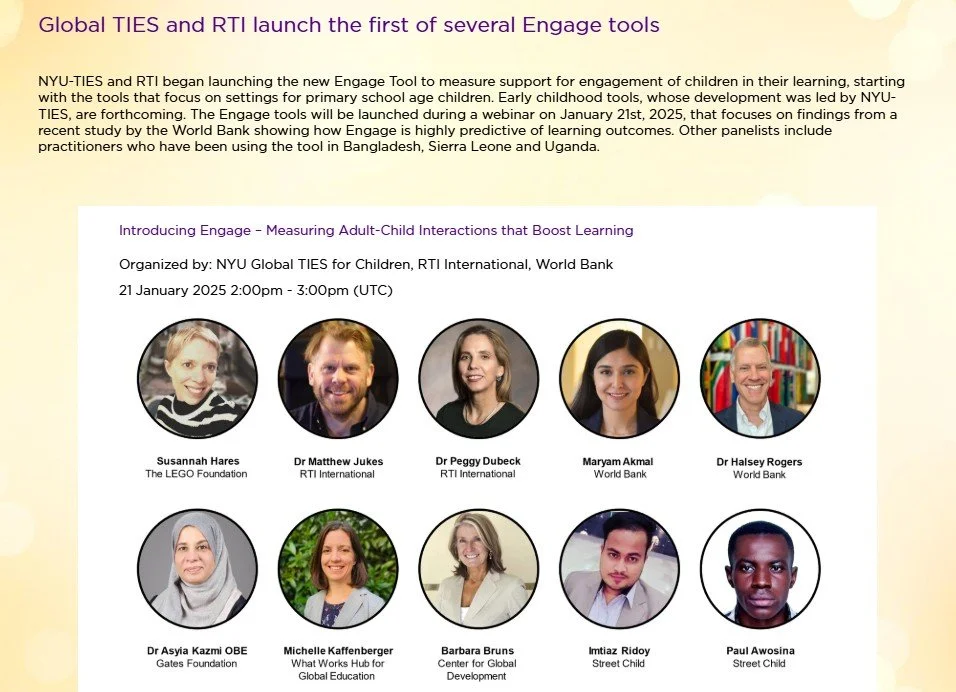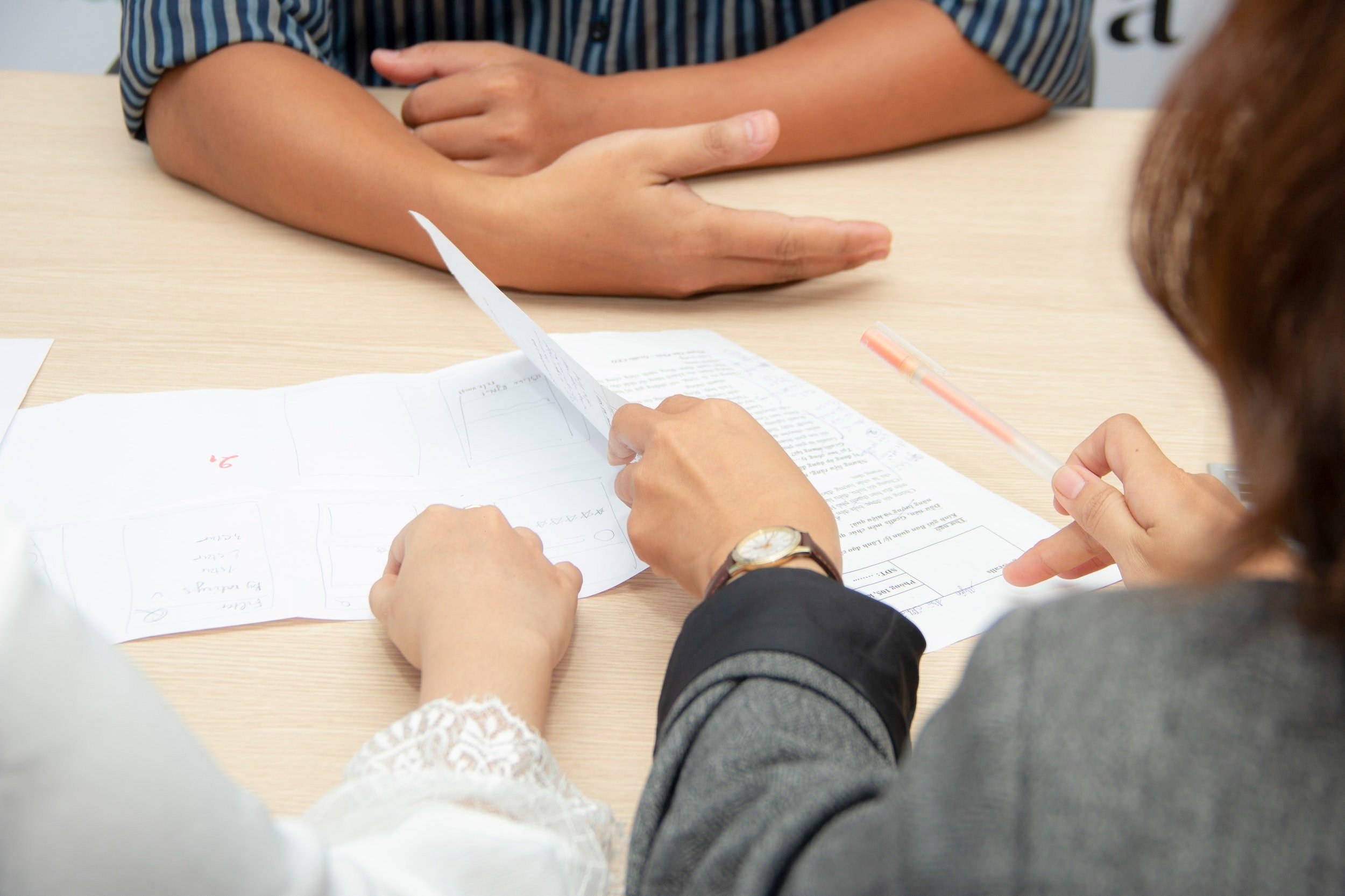Resources
Global TIES and RTI launch the first of several Engage tools
NYU-TIES and RTI began launching the new Engage Tool to measure support for engagement of children in their learning, starting with the tools that focus on settings for primary school age children. Early childhood tools, whose development was led by NYU-TIES, are forthcoming. The Engage tools will be launched during a webinar on January 21st, 2025, that focuses on findings from a recent study by the World Bank showing how Engage is highly predictive of learning outcomes. Other panelists include practitioners who have been using the tool in Bangladesh, Sierra Leone and Uganda.
Introducing the PLAY toolkit [teaser]
The toolkit measures how caregivers and teachers support children’s engagement in their learning. The toolkit consists of observation and survey tools for children from birth to 12-years-old and can be applied across diverse learning settings and contexts
Understanding Settings for Early Childhood Socialization: Evidence from the Rohingya Camps
In this brief, Global TIES researchers demonstrate the utility of rapid ethnography to understand the socialization context of Rohingya children living in Cox’s Bazar Camps, where factors such as economic instability, natural disasters, and the Covid-19 pandemic have continued to change the individual- and family-level environment for Rohingya communities. Results from rapid ethnographic data in conjunction with in-depth parent interviews highlight several key elements contributing to the socialization of young Rohingya refugee children, including: 1) supervision and care of children often extending beyond biological parents and immediate family; 2) agents of socialization and learning extending beyond biological parents and immediate family; 3) parents considering spaces near or around their homes to be unsafe, while children’s behavior indicate otherwise; 4) learning “pockets” or humanitarian play labs (HPLs) within household clusters providing unique opportunities for children to learn and play; and 5) HPL children having access to artifacts for socialization beyond improvised objects from the immediate surroundings.
Image credit:
Margaret Weir
@margotd1 via Unsplash.
Measuring Rohingya Children’s Development: Cultural and Contextual Adaptation of IDELA
In this brief, NYU Global TIES for Children researchers describe a rapid iterative process of cultural, linguistic, and contextual adaptation and extension of child assessment tools for Rohingya Children in Cox's Bazar, Bangladesh. It includes three specific examples showcasing the rigorous, culturally responsive, equity-based approach to adaptation. This report also highlights some of the most critical findings from using this extended IDELA, known as IDELA-E, in our pilot study. Results suggest that IDELA-E is responsive to the environment in which the Rohingya children grow up and can capture their learning and development gains across multiple domains. Assessment using IDELA-E shows the age-based developmental progression of Rohingya children across these five domains: fine and gross motor, emergent literacy, emergent numeracy, socio-emotional, and executive function development. Overall, this brief highlights a rigorous process of cultural and contextual adaptation of tools for assessing children in a low-resourced context in the global south.
Testing Measures of Refugee Camp Environment, Caregiver Mental Health, and Child Social-Emotional Development Among the Rohingya in Cox’s Bazar
In this brief, the fourth in our series, Global TIES researchers show that through analyses of instruments measuring caregivers' perceptions of refugee camp environment, caregiver mental health, and children's social-emotional development, there are reasons for optimism in using these particular scales with the Rohingya community in Cox's Bazar, Bangladesh. Results suggest that the measures examined show generally strong internal reliability and can be successfully adapted for use in this context and they were associated with each other in meaningful ways. In addition to highlighting promising results, this brief also provides a snapshot of the steps involved in selecting, adapting, and testing these scales to examine their suitability and prepare them for large-scale use.
Delivering Quality Research in Culturally Dynamic, Conflict-Affected Contexts: Lessons from Large-Scale Pilot Research in Cox's Bazar
In this third brief in our series, we outline the process and strategies used as we piloted multiple data collection tools that were being considered for use in several large-scale research studies with the Rohingya in Cox's Bazar. This brief aims to provide context and a path forward for future researchers to deliver quality research in this, and other, complex research environments with the ultimate goal of informing the types, design, and delivery of services to support families and foster resilience in these contexts for generations to come.
Looking at Play Through the Eyes of Rohingya Children in Cox's Bazar
The second brief in our series aims to capture the point of view of young Rohingya children in order to provide context to how they may be mediating between their world of origin and the host society through play. Our data show that Rohingya children demonstrate a tremendous amount of spontaneous and creative activity in their everyday lives, despite the many challenges in the Cox's Bazar camps. This brief provides fresh perspectives into the remarkable resilience and creativity these young children possess.
Looking at Play Through the Eyes of Rohingya Children in Cox's Bazar
The second brief in our series aims to capture the point of view of young Rohingya children in order to provide context to how they may be mediating between their world of origin and the host society through play. Our data show that Rohingya children demonstrate a tremendous amount of spontaneous and creative activity in their everyday lives, despite the many challenges in the Cox's Bazar camps. This brief provides fresh perspectives into the remarkable resilience and creativity these young children possess.
Family Socialization and Experiences of Early Childhood Programs in the Rohingya Camps: Study Protocol
Image credit: Van Tay Media (@vantaymedia on Unsplash)
RTI and NYU Partner on New LEGO Foundation Initiative to Measure the Impact of Play
RTI International (RTI), a non-profit research institute, and New York University’s Global TIES for Children Center (NYU-TIES) are pleased to announce our collaboration under the LEGO Foundation’s new Measurement Initiative to develop tools to measure “Learning through Play” across age groups, settings and contexts. This initiative will provide new ways to measure Learning through Play and help researchers understand how play contributes to holistic skills development in children.
Global TIES for Children to Expand Research on Refugee Child Development As Part of $100 Million LEGO Foundation Grant
We are honored to partner with the Lego Foundation, Sesame Workshop, BRAC and the IRC on this historic initiative to understand how play-based learning and support can build a future of hope, creativity, and engagement for a generation of children in some of the most challenging contexts in the world



![Introducing the PLAY toolkit [teaser]](https://images.squarespace-cdn.com/content/v1/5fa0560c3a27c834f6a6b5ac/1680266280744-Q88JNJN0GAHBS4VCLC7Q/Screen%2BShot%2B2023-03-31%2Bat%2B08.37.29.jpg)









